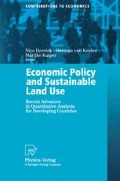Abstract
This paper formalises the determinants of adoption and maintenance of soil conservation practices on peasant households’ food plots in the Dominican Republic highlands, where a local rural development project provides training, technical assistance and subsidies in the form of food-for-work. We model these decisions as an intertemporal labour allocation choice in the context of household-specific food markets imperfections. From the theoretical model, we derive consistent empirical models (probit and duration models). Results show, that food subsidies help bring marginal households into soil conservation. Households facing a higher return to their labour on the labour market tend nevertheless to abandon conservation practices once the subsidy stops. Large landholdings are also associated with less soil conservation. The main adopters are thus households strongly vested in agriculture, especially if they depend on own production for their consumption.
Access this chapter
Tax calculation will be finalised at checkout
Purchases are for personal use only
Preview
Unable to display preview. Download preview PDF.
References
Besley, T. & A. Case (1993): Modeling technology adoption in developing countries. American Economic Review 83, 396–402
Brière, B. de la & A. Jímenez. (1994): Adopción de prácticas agroforestales para una agricultura sostenible en la Sierra: el Programa de Autosufficiencia Alimentaria. Department of Agricultural and Resource Economics, UC Berkeley, mimeo
Burt, O. (1981): Farm level economics of soil conservation in the Palouse area of the Northwest. American Journal of Agricultural Economics 63, 83–92
Feder, G., R.E. Just & D. Zilberman (1985): Adoption of agricultural innovations in developing countries: a survey. Economic Development and Cultural Change 33, 255–298
Foster, A. & M. Rosenzweig (1995): Learning by doing and learning from others: human capital and technical change in agriculture. Journal of Political Economy 103, 1176–1209
Goungetas, B. & S. Johnson (1992): The impact of household size and composition on food consumption. Iowa State University: Center for Agricultural and Rural Development.
Greene, W.H. (1993): Econometric analysis. Englewood Cliffs, Prentice Hall, NJ
Janvry, A. de, M. Fafchamps & E. Sadoulet (1991): Peasant household behaviour with missing markets: some paradoxes explained. Economic Journal 101, 1400–1417
Janvry, A. de, B. de la Brière & E. Sadoulet (1994): Adoption and maintenance of soil conservation techniques in the Dominican Sierra. A report prepared for the OECD Watershed Project and IDB Environment Division, mimeo
Lutz, E., S. Pagiola & C. Reiche (1994): The costs and benefits of soil conservation: the farmer’s viewpoint. The World Bank Research Observer 9, 273–295
Mc Connell, K.E. (1983): An economic model of soil conservation. American Journal of Agricultural Economics 65, 83–89
Sadoulet, E. & A. de Janvry (1995): Quantitative development policy. John Hopkins University Press, Baltimore, MD
White, T. & C. Runge. (1994): Common property and collective action: lessons from cooperative watershed management in Haiti. Economic Development and Cultural Change 43, 1–41
Author information
Authors and Affiliations
Editor information
Editors and Affiliations
Rights and permissions
Copyright information
© 2001 Springer-Verlag Berlin Heidelberg
About this chapter
Cite this chapter
de la Brière, B. (2001). Imperfect Food Markets and Household Adoption of Soil Conservation Practices in the Dominican Republic Highlands: Household Probit and Duration Models. In: Heerink, N., van Keulen, H., Kuiper, M. (eds) Economic Policy and Sustainable Land Use. Contributions to Economics. Physica, Heidelberg. https://doi.org/10.1007/978-3-642-57558-7_6
Download citation
DOI: https://doi.org/10.1007/978-3-642-57558-7_6
Publisher Name: Physica, Heidelberg
Print ISBN: 978-3-7908-1351-7
Online ISBN: 978-3-642-57558-7
eBook Packages: Springer Book Archive

